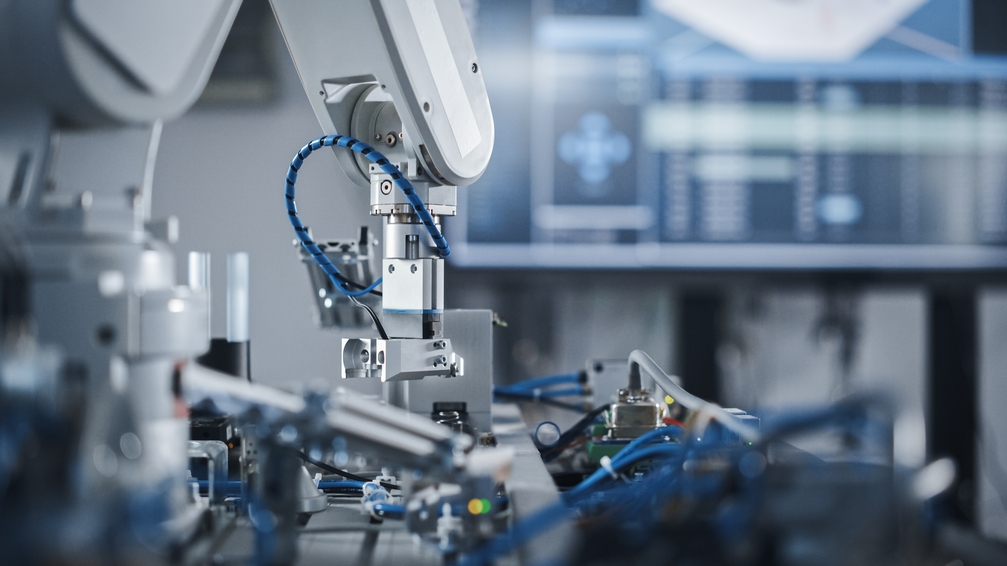B.Tech in Robotics and Automation (Eligibility, Scope and Career Prospects)

Every industry is evolving with automation, with robotics in the picture. More and more robotics courses like B. Tech Robotics and Automation are being introduced at colleges to help students graduate with advanced knowledge of future robotic technologies. Here's what you can do with a Robotics and Automation degree.
B.Tech Robotics and Automation Engineering: Course Highlights
B.Tech Robotics and Automation Engineering isn't just about building robots; it's about crafting intelligent machines that can think, adapt, and revolutionize and simplify processes. This programme has an engineering and computer science base, equipping you with the skills to design, build, and program robots for various applications.
From intricate industrial arms to self-driving cars, you can explore the mechanics, electronics and control systems and the power of AI and machine learning to imbue robots with intelligence and autonomy. You will graduate with technical expertise and the vision to shape the future of automation, where robots become seamless companions, collaborators, and even problem-solvers in a world driven by efficiency and innovation.
Eligibility Criteria for B.Tech Robotics and Automation Engineering
You can apply for B. Tech Robotics and Engineering if you have 60% aggregate marks in 10+2 (with Physics, Mathematics and English). If you want to join B.Tech Mechanical Engineering (Robotics and Automation), you need to have 50% in 10+2 in Math’s, Physics and Chemistry. Additionally, having a good score in either JEE, MHTCET, or PERA can help you join MIT-WPU!
B.Tech Robotics and Automation Engineering: Syllabus & Subjects
This is the most common syllabus which you will find in India. However, it is subject to change from every college. Here's what students can expect:
Mechanics: Understand the principles of motion, forces, and stresses governing robot movement and design. Electronics and Control Systems: Master designing and implementing circuits and control systems that power robots.
Computer Science and Programming: Learn programming languages and algorithms to control robot behavior and interact with the environment.
Mathematics: A strong foundation in calculus, linear algebra, and differential equations is crucial for analytical problem-solving in robotics. Physics: Understand the laws of physics governing robot movement, energy transfer, and sensor operation.
Robotics-Specific Subjects:
Robot Kinematics and Dynamics: Analyze robot motion, forces, and torques to design efficient and effective robots.
Robot Sensors and Perception: Explore various sensors robots use to perceive their surroundings and gather data.
Sensor Fusion and Data Analysis: Learn how to combine data from multiple sensors and analyze it for robot decision-making.
Robot Control Systems: Design and implement control algorithms for various robot behaviors and tasks.
Artificial Intelligence and Machine Learning: Understand how AI and machine learning can be used to make robots more intelligent.
Automation Systems and Industrial Robotics: Learn about automated systems in various industries and how robots are used in manufacturing and production.
Scope of B.Tech Robotics and Automation Engineering
The future of robotics and automation is brimming with possibilities. Graduates of this programme can find exciting career opportunities in a wide range of industries, including:
Manufacturing: Design and develop robots for automated assembly lines, material handling, and quality control.
Healthcare: Build robots for surgical assistance, rehabilitation therapy, and medical imaging.
Agriculture: Develop mechanical systems for planting, harvesting, and crop monitoring.
Logistics and transportation: Create robots for automated warehousing, delivery drones, and self-driving vehicles.
Aerospace and defense: Design robots for space exploration, underwater research, and military applications.
Diverse Job Opportunities
With B.Tech in Robotics and Automation, you can work as:
- Robotics engineer
- Automation engineer
- AI specialist
- Control systems engineer
- Mechatronics engineer
- Research and development engineer
- Robotics technician
- Field service engineer
Global Relevance
The demand for skilled robotics and automation professionals is increasing globally. With a B. Tech degree, you can pursue lucrative careers anywhere!
Continuous Innovation
The field of robotics and automation is constantly evolving, with new advancements emerging every day. As a graduate, you will be one of the driving factors of this dynamic field, always learning and adapting to new technologies.
Versatility of Applications
The applications of robotics and automation are limitless. From revolutionizing industries to improving our daily lives, the possibilities are endless. As a B. Tech graduate, you may have the power to shape the future through your innovative ideas and creations.
Collaboration with AI
Integrating AI with robotics creates a powerful synergy, leading to the development of even more intelligent and autonomous robots. With yourB.Tech degree, you'll be able to play a crucial role in this exciting convergence of technologies.
Career & Jobs Opportunities After B. Tech Robotics and Automation Engineering
With your B. Tech degree, you can embark on a rewarding career in robotics and automation. Here are a few specific examples of the exciting opportunities that await you:
Robotics Engineering: Design and develop cutting-edge robots for various applications, from industrial automation to healthcare.
Automation Specialist: Implement and maintain automated systems in factories, warehouses, and other industrial settings.
Apply NowFAQs
Is a B. Tech in Robotics & Automation only for those with an engineering background?
Anyone who has chosen math’s, physics, or chemistry as their core can pursue a B. Tech in Robotics and Automation.
How long does it take to complete the B. Tech in Robotics & Automation?
It's like every other B. Tech course, which lasts four years.
Is robotics and automation engineering a promising career?
The field of robotics is undergoing a significant change globally, and now is an excellent time for students to pursue it!





 admissions@mitwpu.edu.in
admissions@mitwpu.edu.in
